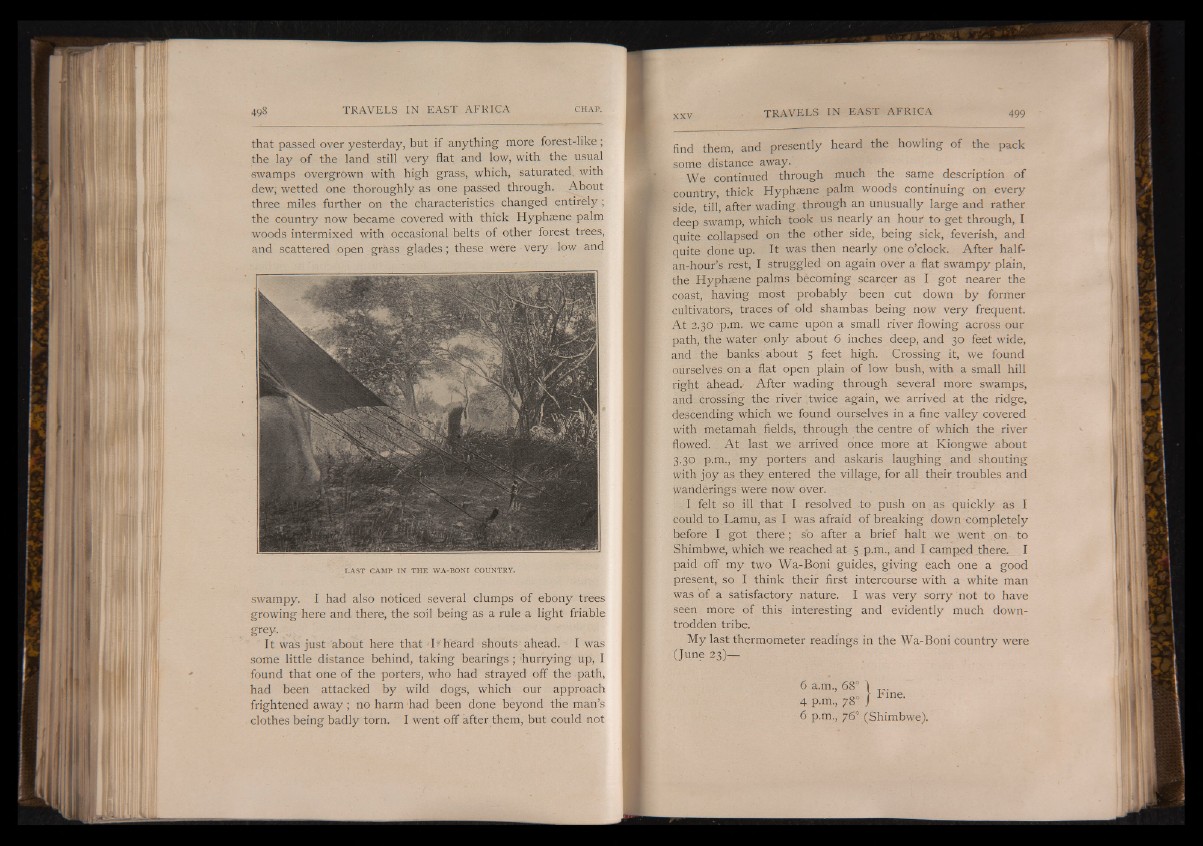
that passed over yesterday, but if anything more forest-like ;
the lay of the land still very flat and low, with the usual
swamps overgrown with high grass, which, saturated, with
dew, wetted one thoroughly as one passed through. About
three miles further on the characteristics changed entirely;
the country now became covered with thick Hyphaene palm
woods intermixed with occasional belts of other forest trees,
and scattered open grass glades; these were very low and
LAST CAMP IN THE WA-BONI COUNTRY.
swampy. I had also noticed several clumps of ebony trees
growing here and there, the soil being as a rule a light friable
grey - . . .
It was just about here that 'I? heard shouts' ahead. I was
some little distance behind, taking bearings; hurrying up, I
found that one of the porters, who had strayed off the path,
had been attacked by wild dogs, which our approach
frightened awa y ; no harm had been done beyond the man’s
clothes being badly torn. I went off after them, but could not
find them, and presently heard the howling of the pack
some distance away.
We continued through much the same description of
country, thick Hyphaene palm woods continuing on every
side, till, after wading through an unusually large and rather
deep swamp, which took us nearly an hour to get through, I
quite collapsed on the other side, being sick, feverish, and
quite done up. It was then nearly one o’clock. After half-
an-hour’s rest, I struggled on again over a flat swampy plain,
the Hyphaene palms becoming scarcer as I got nearer the
coast, having most probably been cut down by former
cultivators, traces of old shambas being now very frequent.
At 2.30 p.m. we came upon a small river flowing across our
path, the water only about 6 inches deep, and 30 feet wide,
and the banks, about 5 feet high. Crossing it, we found
ourselves, on a flat open plain of low bush, with a small hill
right ahead. After wading through several more swamps,
and crossing the river twice again, we arrived at the ridge,
descending which we found ourselves in a fine valley covered
with metamah fields, through the centre of which the river
flowed. At last we arrived once more at Kiongwe about
3.30 p.m., my porters and askaris laughing and shouting
with joy as they entered the village, for all their troubles and
wanderings were now over.
I felt so ill that I resolved to push on as quickly as I
could to .Lamu, as I was afraid of breaking down completely
before I got there; so after a brief halt we went on to
Shimbwe, which we reached at 5 p.m., and I camped there, I
paid off my two Wa-Boni guides, giving each one a good
present, so I think their first intercourse with a white man
was of a satisfactory nature. I was very sorry not to have
seen more of this interesting and evidently much downtrodden
tribe.
My last thermometer readings in the Wa-Boni country were
(June 23)—
6 a.m., 68° J „ .
4 p.m„78- r me'
6 p.m., 76° (Shimbwe).